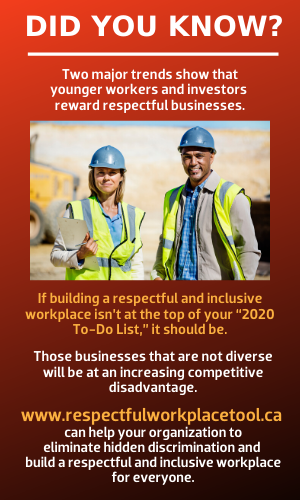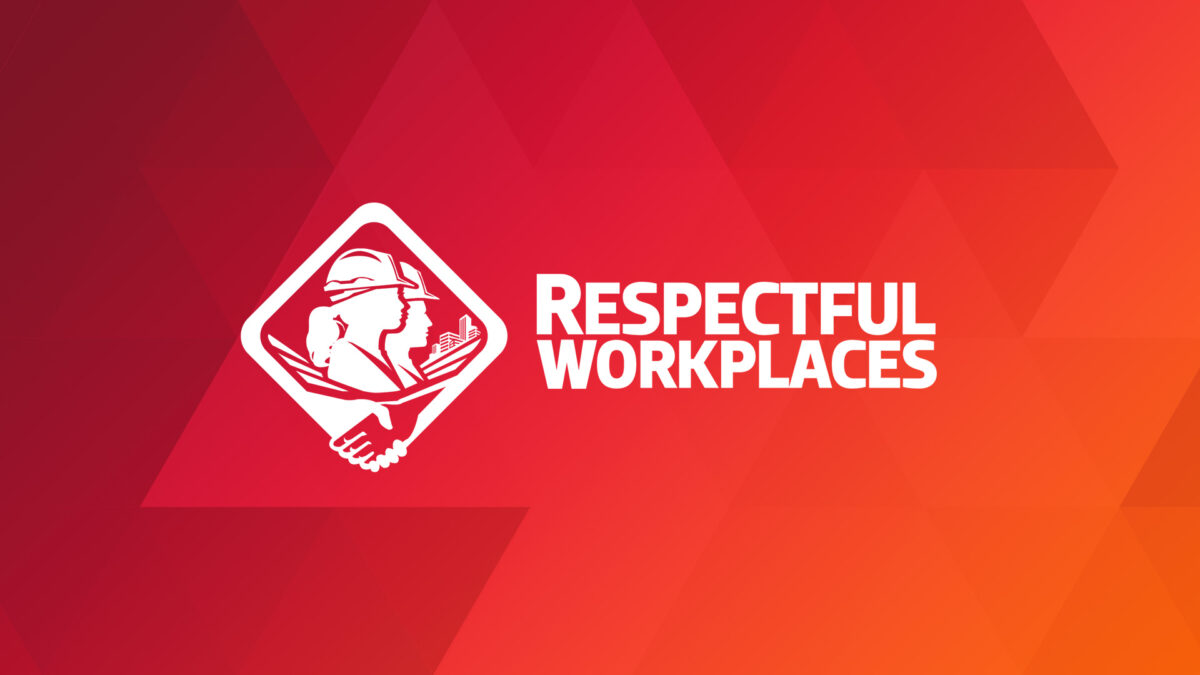Does your organization create the respectful workplace that workers and investors expect in 2020?
If building a respectful and inclusive workplace isn’t at the top of your “2020 To-Do List,” it should be.
Businesses that commit to creating and supporting a respectful and inclusive workplace welcome a diverse workforce, including those people with different genders, backgrounds, and circumstances. This diversity will allow them to take advantage of two major trends in 2020 and beyond. Those businesses that are not diverse will be at an increasing competitive disadvantage.
The first trend that will impact businesses in 2020 and beyond is the demographic shift to a workforce dominated by millennial (those born between January 1983 and December 1994) and Gen Z workers (those born between January 1995 and December 1999), also referred to as “iGen,” who demand diversity, inclusion, and social responsibility from businesses.
In the year 2020, millennial workers will make up about half of the workforce and Gen Z workers will represent about 36% of the workforce. Millennial and Gen Z workers believe that businesses have an important role to play in making the world a better place, with climate change at the top of the list, and helping their workers to be successful is second on the list.

The Deloitte Millennial Study 2019 found that for millennial and Gen Z workers, “diversity” includes those people who, because of their backgrounds, never get a fair chance to achieve success no matter how hard they study and work. For younger workers, diversity is an indicator that a business is promoting equity and social mobility.
They place business second only to government in its social responsibility to correct this inequity and improve social mobility.
However, many also have little faith that business leaders are socially responsible, but those that are, will be rewarded with loyalty. Twenty-three percent said they would start/deepen their relationship with a company that has diversity among its leadership team and diversity policies or behaviours. However, millennial and Gen Z workers say that they are willing to part ways with companies that don’t share their values: 17% said they would lessen their relationship if the business doesn’t have these values.
The trend is clear: younger workers want to work for businesses that are diverse, inclusive, and socially responsible.
The second trend is the growing research confirming that businesses that are diverse and inclusive experience greater financial returns. Investors in publicly traded businesses have put gender diversity on the scorecard. They are rewarding those businesses that are successful in exceeding gender diversity targets with higher share prices. These market trends will have a trickle-down effect on all businesses.
Research has shown a correlation between gender diversity and financial results. For example, the global consulting firm, McKinsey and Co., found that companies in the top 25% of their industry based on gender or racial and ethnic diversity in their leadership ranks are more likely to have financial returns above their national industry medians.
However, new research shows that there is a direct connection, not just a correlation, between the share of women that publicly traded companies employ (in operations and management roles) and higher share prices.
The Stanford Graduate School of Business recently published the results of a study to determine whether gender diversity hiring affects share prices. It found that share prices rose significantly immediately after a business announced better-than-expected levels of gender diversity. The study focused on the technology and financial sectors, both of which have high levels of gender disparity in staffing.
The trends are clear: the marketplace in 2020 and beyond will be made up of workers and investors who want diverse, inclusive, and socially responsible workplaces.
Start 2020 by completing the BuildForce Respectful Workplace Online Self-Assessment Tool to ensure your efforts to create and support a respectful and inclusive workplace will be effective. It allows management to assess its progress in creating and supporting the type of workplace environment that younger workers want, and that can help to improve financial performance.
For more info:
Deloitte. “The Deloitte Millennial Survey 2019.” See:
www2.deloitte.com/global/en/pages/about-deloitte/articles/millennialsurvey.htmlMcKinsey and Co. “Why Diversity Matters.” 2015. See:
www.mckinsey.com/business-functions/organization/our-insights/why-diversity-matters- Stanford Graduate School of Business. “Do Investors Really Care About Gender Diversity?” 2019. See:
www.gsb.stanford.edu/insights/do-investors-really-care-about-gender-diversity
What can an effective Respectful and Inclusive Workplace Program deliver?
- Become an employer of choice – attract, retain, and advance top talent from all sources of labour
- Unlock collaboration and innovation – create high-performing teams through diversity of thought and experience
- Build your brand – your organization will gain a competitive edge as a leader and innovator
Get started today!
The BuildForce Canada Online Respectful and Inclusive Workplace Toolkit includes:
- the Respectful Workplace Online Self-Assessment Tool to assist organization leadership in assessing their current situation and identifying where they may need to make changes
- the Respectful Workplace Policy Framework and Implementation Guide to assist organizations in creating and implementing a policy that supports a respectful and inclusive workplace
- the Respectful Workplace Online Training Course to train workers on how to create and support a respectful and inclusive workplace
All the resources you need to create and support a respectful and inclusive workplace!

This project has been funded by Status of Women Canada.

Respectful and Inclusive Workplaces
